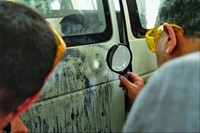Advertisement
Grab your lab coat. Let's get started
Welcome!
Welcome!
Create an account below to get 6 C&EN articles per month, receive newsletters and more - all free.
It seems this is your first time logging in online. Please enter the following information to continue.
As an ACS member you automatically get access to this site. All we need is few more details to create your reading experience.
Not you? Sign in with a different account.
Not you? Sign in with a different account.
ERROR 1
ERROR 1
ERROR 2
ERROR 2
ERROR 2
ERROR 2
ERROR 2
Password and Confirm password must match.
If you have an ACS member number, please enter it here so we can link this account to your membership. (optional)
ERROR 2
ACS values your privacy. By submitting your information, you are gaining access to C&EN and subscribing to our weekly newsletter. We use the information you provide to make your reading experience better, and we will never sell your data to third party members.
Policy
California Passes Researcher Protection Law
Bill makes it illegal to publish academics' information for criminal intent
by Elizabeth K. Wilson
October 1, 2008

The August bomb attacks on the homes of two University of California, Santa Cruz, researchers has spurred the swift passage of a new California law making it illegal to publish the names and addresses of academic researchers and their families with the intent to commit a violent crime.
The Researcher Protection Act, which was written by Assembly member Gene Mullin (D-South San Francisco), also forbids people from entering academic researchers' homes "with the intent to disrupt, preventing the exercise of, or interfering with the researcher???s academic freedom."
The bill, known as A.B. 2296, was introduced in February and had been wending its way through the legislative process. It then got a boost in August when bombs destroyed the car of one UCSC biomedical researcher and the front of the off-campus house of UCSC assistant professor David Feldheim, who is in the department of molecular, cell, and developmental biology. Both researchers were believed to be targeted by animal rights extremists (C&EN, Aug. 11, page 11).
The bill then swiftly passed in both houses of the legislature, and Gov. Arnold Schwarzenegger signed it into law on Sept. 29.
Mullin says he's "very pleased" the governor signed the bill. "We felt this would have good chance to be signed because a lot of attention has been paid to this legislation" since the bombings, he says.
In addition to the recent attacks at UCSC, there have been other high-profile attacks and threats in recent years aimed at academics at other UC campuses, including Los Angeles, Berkeley, Davis, and San Diego.
The new law is apparently unique to California and is designed to have more teeth than the Federal Animal Enterprise Terrorism Act, which passed in November 2006. The federal law contains some similar provisions against harassment of and violence against researchers, but it requires that cases investigated under it involve interstate commerce and specifies that those cases be tried only by federal attorneys.
The new California law would allow local district attorneys to prosecute cases. Actions such as the distribution of leaflets found in a Santa Cruz coffee shop shortly before the bombings, naming and threatening 13 UCSC researchers, including chemistry professor Pradip K. Mascharak, would now be criminalized under the new law.
UCSC officials and law enforcement agencies have been offering protection to the named researchers since the bombings, although details are not being released, according to UCSC spokesman Tim Stephens.
"This law will provide law enforcement with some of the tools necessary to help protect academic researchers so they can continue to perform groundbreaking research without the threat of violence," UC President Mark G. Yudof said in a statement.
UCSC chemistry department Chair Ólöf Einarsdóttir applauded the signing of the new law. "I am a mother as a well as a professor," she says. "I think it's important for young people who want to enter into science to know they will be protected."



Join the conversation
Contact the reporter
Submit a Letter to the Editor for publication
Engage with us on Twitter